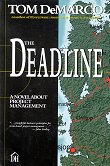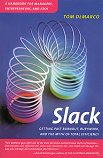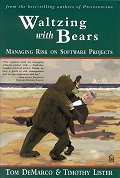During the 90s, companies were busy slimming down, getting more
efficient, cutting out the slack, becoming lean and mean. They are now so
efficient that they haven't got time to do anything else, including
change, should that be necessary. And it is necessary, in this fast
changing world. Efficiency and agility are just not simultaneously
possible. (And this is true not just in organisations, but in the
artefacts we build. For example, as we use our roads more and more "efficiently",
it takes smaller and smaller problems to cause massive jams.)
DeMarco shows how why it's essential to build some slack into the
system. Enough time for people to stop and think, to plan for the
future, not just scurry around frantically in the present. He rails
against lots of things that hinder change: not only efficiency, but the
climate of Fear and Blame, the intolerance of failure, and the lack of
managerial teamwork, that make people risk averse. Oh, and that much of
that vaunted efficiency is purely illusory, in any case.
This is a good swift read that nails many points firmly on the head.
Next, as with so many of these sensible managerial books, is how
to get the right people to read it?



